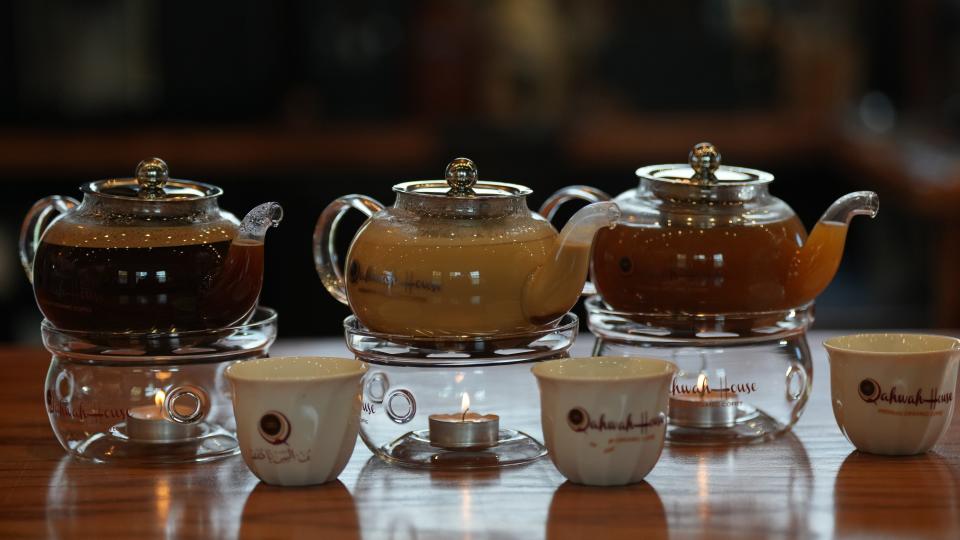Popular Qahwah House opens in Clifton, serving authentic Yemeni coffee
Coffee lovers who visit the new Qahwah House in Clifton will find more than just a premium cup of rich, imported brew. They will also find a story rich in history, tradition and culture that starts centuries ago in the Yemeni port city of Mocha, along the Red Sea.
At the Qahwah House — "qahwah" means "coffee" in Arabic — a massive map adorns a wall depicting historic trade routes of Arabica beans from Yemen to the rest of the world. In the 15th century, Yemen became the first place to cultivate and drink coffee beverages, and then exported the crop around the world.
It’s a history that franchise founder Ibrahim Alhasbani is eager to share.
“Everyone, when they talk about Yemen and Arab countries, it’s sad stories of war,” Alhasbani said. “They don’t know the good part. We want to show the other side, show our culture.”
"Yemen is the first place for coffee," he added. "Anything that comes from the place of origin is always the best."
For Alhasbani, family pride also runs deep. The beans at Qahwah House are plucked from the farm that his family has owned and operated for eight generations in Sanaa, the Yemeni capital. The coffee trees stretch across fertile terraces carved into mountainsides and thrive in the warm climate and high altitude.
The quality of the coffee and the origin story has resonated with customers. The Clifton location, which opened in November at 441 Crooks Ave., is his fifth store since he started the company in 2017. Alhasbani expects another 15 locations to open by the end of 2023.
At the Clifton Qahwah House, the beans are ground and served in light and medium roasts used in aromatic cups of coffee, or in coffee drinks like lattes, cappuccinos and espressos. Some beverages are served seasoned with cardamom and ginger. Customers can also indulge in pastries such as sabaya, a flaky layered bread cake popular in Yemen.
All about coffee:13 new must-try North Jersey coffee shops for frothy cappuccino and delicious pastries
Best breakfast spots to try:14 best new restaurants for breakfast in North Jersey
For subscribers:These 14 restaurants have lasted decades for a reason. Here's why
Waell Ali, a co-owner of the Clifton location, said he learned about the heritage of Yemen, his family’s country of origin, when he started working at Qahwah House.
“It’s something to be proud of and something to bring awareness to Yemen,” he said. “It’s a beautiful thing.”
The birth of coffee culture
Coffee plants first grew in Ethiopia, but Yemen was the first place where beans were roasted and consumed in beverages, said Nancy Um, an art historian who has researched and written about Mocha — Yemen's historic port on the Red Sea — and the coffee trade.
Around the 15th century, Sufi monks were known to make coffee to stay awake during mediation and prayers. As it grew in popularity, the lucrative crop was shipped across the Middle East and Europe from the Red Sea port.
“When we have café mocha, it’s all named after the port city of Mocha in Yemen,” said Um, an associate director at the California-based Getty Research Institute. “People erroneously think coffee originated in Latin America or the Caribbean and do not realize the complicated history of coffee.”
Coffee always had a social quality to it, Um said, adding that coffeehouses could be found in major cities like Cairo, Istanbul and Damascus by the mid 1500s. The drink also had detractors, who thought it could inspire radical ideas or seditiousness because of its social character, she said.
Yemen’s hold on the coffee trade ended when European countries began planting the crop in their colonies in Latin America and the Caribbean, she said.
A coffee celebrated in song
Alhasbani, who formerly worked in marketing, traveled to New York City in 2011 for a visit. Around that time, the Arab Spring reform movement had taken hold and inspired protests in countries including Yemen. He waited for political tensions to subside so he could return.
Instead, war broke out, spiraling into a brutal conflict and proxy war that continues today. It means that getting the product to the U.S. can be a delicate, months-long process, but it's worth the effort, Alhasbani said. He believes it’s the best coffee in the world.

He described the coffee as having natural sweetness and a fruity, not bitter, aftertaste. It also has a natural chocolate flavor that other places have tried to emulate by adding chocolate to coffee and calling it mocha.
Alhasbani, who now lives in Michigan, opened the first Qahwah House in 2017 in Dearborn.
The Clifton café, which opened Nov. 6, is in a location that straddles the border with Paterson in an area that is home to many Middle Eastern restaurants, bakeries and grocery stories.
Aleyna Ciftci, 24, of Wayne said she used to travel to Brooklyn to visit another franchise location that became a popular hangout for young Muslims. Now, she doesn't have to go far. She enjoys talking with friends, playing cards and drinking chai there, she said. In Turkish culture, she said, families are accustomed to gathering in the evenings with coffee and tea to talk or play games.
Aleyna's father, Bilal Ciftci, who waited for his order on a recent rainy afternoon, said the coffee at Qahwah House reminded him of his native country. “I am from Turkey," he said. "We have songs with lyrics about Yemeni coffee.”
This article originally appeared on NorthJersey.com: This Clifton Yemeni coffee shop brews flavor, culture and history

